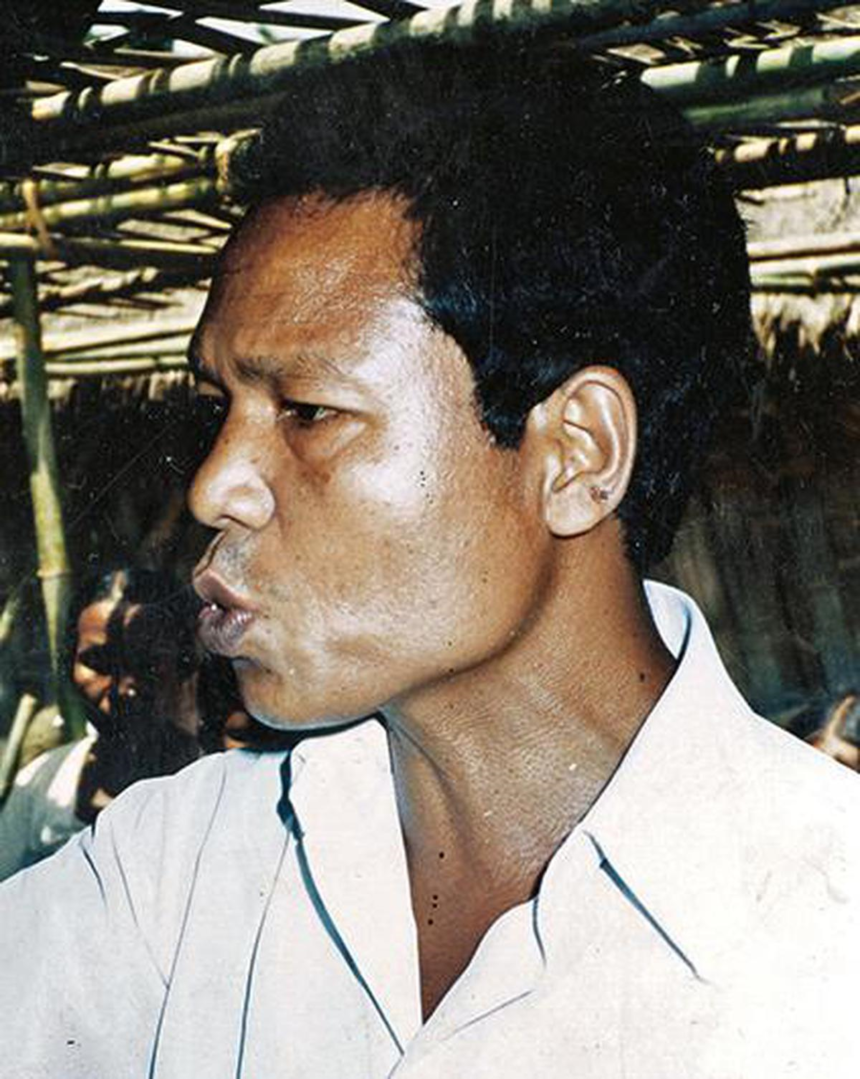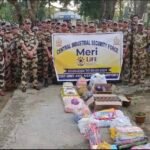Nagendra Jamatia (22 May 1948–21 January 2019) was an Indian politician from Tripura. He was a member of the Indigenous Nationalist Party of Twipra and served as a cabinet minister in the Tripura Government from 1988 to 1993. His contributions spanned both politics and literature.
Here are some key points about Nagendra Jamatia:
- Early Life and Education:
- He was born as the third child of Smt. Gandhi Kanya Jamatia and Shri Mohan Chandra Jamatia, who were farmers in the small village of Tota Kami in the present Gomati District of Tripura.
- Nagendra Jamatia was a brilliant student academically. He completed his schooling at Ramesh School in Udaipur.
- He graduated from Maharaja Bir Bikram College (MBB College) in Agartala. Initially admitted to the science stream, he later changed his subject to Arts due to his passion for literature and economics.
- Notably, he was a classmate of Manik Sarkar (former Chief Minister of Tripura) at Ramesh School and Badal Choudhury (ex-Minister) at MBB College.
- Entry into Politics:
- Nagendra Jamatia began his political career as a student leader and was the founder General Secretary of the Tribal Students Federation (TSF) in 1968.
- Later, he joined the Tripura Upajati Juba Samiti (TUJS) and became an MLA of the state, subsequently serving as a Minister from the same party.
- He was deeply concerned about the discrimination faced by the indigenous population of Tripura due to the rapid influx of refugees from East Pakistan (now Bangladesh).
- Legislative Career:
- Jamatia was elected as a member of the Tripura Legislative Assembly from Ampinagar multiple times:
- He played a crucial role in brokering peace with the insurgent group Tripura National Volunteers (TNV) in 1988.
- His efforts led to a peace accord that was signed in the presence of then Prime Minister Rajiv Gandhi in New Delhi.
- Legacy and Contributions:
- Nagendra Jamatia’s writing skills and social engagements were admired by many.
- He served as a minister in the Congress-led coalition government for five years (1988–1993).
- His successful negotiation with TNV resulted in a significant milestone for peace in Tripura.
Today, we celebrate the birth anniversary (May 22, 2024) of Nagendra Jamatia, a towering figure in the history of the Tiprasa struggle and politics. His legacy is a testament to his unwavering dedication to the cause of his people, the Tiprasas of Tripura, who have faced significant demographic shifts and political challenges over the decades.
Born during a time when the Tiprasa community was experiencing a dramatic reduction from majority to minority status due to the influx of outsiders, Jamatia’s early life was shaped by the growing need for political and cultural preservation. As a child, he witnessed the majority status of his people, but by the time he completed his education, the demographic landscape of Tripura had completely inverted, making the Tiprasas a minority in their homeland.
Jamatia’s political journey began during his college days. Initially pursuing a science stream, his deep interest in sociology, political science, and economics led him to switch to the arts. This change marked the beginning of his lifelong commitment to political activism and leadership.
In 1968, Jamatia co-founded the Tribal Students’ Federation (TSF), now known as the Twipra Students’ Federation, and served as its first general secretary. TSF, often referred to as “the factory of Tiprasa leaders,” played a crucial role in mobilizing and educating the youth on nationalistic principles and the importance of safeguarding their future. The organization has been instrumental in producing numerous influential leaders for the Tiprasa community.
Following his impactful tenure with TSF, Jamatia entered the political arena, contesting the 1977 elections under the Tripura Upajati Juba Samiti (TUJS) ticket from the Ampinagar constituency. His victory marked the beginning of a prolific political career, during which he was elected as a Member of the Legislative Assembly (MLA) for five terms. Jamatia also served as a cabinet minister in alliance with the Indian National Congress (INC) for five years, during which he played a pivotal role in fostering dialogue with armed strugglers of the Tripura National Volunteers (TNV).
One of Jamatia’s most significant contributions was his instrumental role in the signing of the TNV tripartite accord in 1988. This landmark agreement, which increased the number of reserved Scheduled Tribe (ST) seats in the Tripura Legislative Assembly from 17 to 20, remains a major achievement in Tiprasa political history. The success of this accord is largely attributed to the efforts of Jamatia and BK Hrangkhawl, reflecting their commitment to securing better political representation and rights for the Tiprasa community.
As we honor Nagendra Jamatia on his birth anniversary, we remember a leader whose vision and dedication have left an indelible mark on the political landscape of Tripura. His legacy continues to inspire new generations of Tiprasa leaders to strive for justice, equality, and the preservation of their cultural heritage.
Here are some key points from your description:
- Demographic Shift:
- Nagendra Jamatia witnessed the transformation of Tripura’s demography, where the native Tiprasa population shifted from being a majority to a minority due to the influx of foreigners.
- Despite this challenge, his nationalistic feelings and determination to fight for the community’s future remained strong.
- Education and Political Beginnings:
- His college days marked the start of his political journey.
- Initially in the science stream, his interest in sociology, political science, and economics led him to switch to arts.
- As the founding General Secretary of the Tribal Students’ Federation (TSF), he played a crucial role in shaping the leadership of the Tiprasa community.
- Electoral Career:
- Nagendra Jamatia contested elections with the Tripura Upajati Juva Samiti (TUJS) ticket from the Ampinagar constituency in 1977.
- He served as an MLA for five terms and contributed significantly to the political landscape of Tripura.
- TNV Accord:
- His instrumental role in establishing communication with the armed strugglers of the Tripura National Volunteers (TNV) and signing the TNV accord in 1988 remains a significant achievement.
- The accord increased the number of reserved Scheduled Tribe (ST) seats in the Tripura Legislative Assembly from 17 to 20.
The implementation of the Tripura National Volunteers (TNV) accord faced several challenges due to the complex socio-political context and historical factors. Here are some key challenges:
- Demographic Transformation and Ethnic Conflict:
- The demographic shift caused by immigration from East Bengal (now Bangladesh) significantly altered Tripura’s population composition.
- The indigenous tribes, including sub-clans like Debbarma, Reang, Jamatia, and others, were once in the majority but became a minority.
- This demographic change led to a fierce ethnic conflict that affected the indigenous people of Tripura.
- Marginalization of Indigenous People:
- After the end of princely rule, ballot-box democracy marginalized indigenous communities in terms of political power.
- It took more than 40 years for Tripura to see its first and only tribal Chief Minister, Dasarath Deb, who held office for four years before a non-tribal leader returned to power in 1993.
- TNV Accord and Insurgency:
- Before the peace accord was signed in October 1988, the TNV was considered the most powerful and dreaded underground group in Tripura.
- TNV activities caused panic throughout the state in the late 1980s.
- The TNV accord was achieved through an intense arms struggle, which was different from the purely democratic approach of the tripartite agreement.
- Tripartite Agreement and Current Issues:
- The recent tripartite agreement, signed by the Tipra Motha party with the Center and the state government, addresses issues related to the Tripura Tribal Areas Autonomous District Council (TTAADC).
- Key points include direct funding of the TTAADC by the Center, empowerment of the autonomous district council, land rights, and the establishment of a police organization.
- The Tipra Motha party insists on a joint working group to fulfill the aspirations of the indigenous people.
AGULI STAFF DESK









